How To Use Intermittent Fasting (IF) To Boost Testosterone [Before & After Pics]
![How To Use Intermittent Fasting (IF) To Boost Testosterone [Before & After Pics]](/assets/images/intermittent-fasting-testosterone-hgh.webp)
Today I’m going to show you how to use Intermittent Fasting (IF) to maximize your anabolic hormonal health.
- HGH
- Testosterone
- Insulin
- Etc.
In fact:
Without IF, I never would have been able to double my T from baseline.
And today, you’re going to learn how to do it too.
The best part?
Fasting provides many (many!) other benefits beyond hormone optimization.
No joke.
I mean, just look at the science:
Table Of Contents
- Intermittent Fasting 101
- How Does IF Work?
- 9 Poweful Benefits Of Intermittent Fasting
- Prevents Low T
- Increases Testosterone Production
- Increases HGH Levels
- Stablizes Insulin
- Reduces Estrogen
- Resets Leptin
- Reduces Inflammation
- Promotes Anabolic Activity
- Other Benefits
- Fasting In Bodybuilding
- Do's & Dont's Foods List
- What About Meds & Sups
- Case Study (Before & After Pics)
- Best IF Resources Online
- Conclusion
Intermittent Fasting 101
I started experimenting with fasting 2 year’s ago.
And it’s proven to be invaluable for optimizing hormonal health.
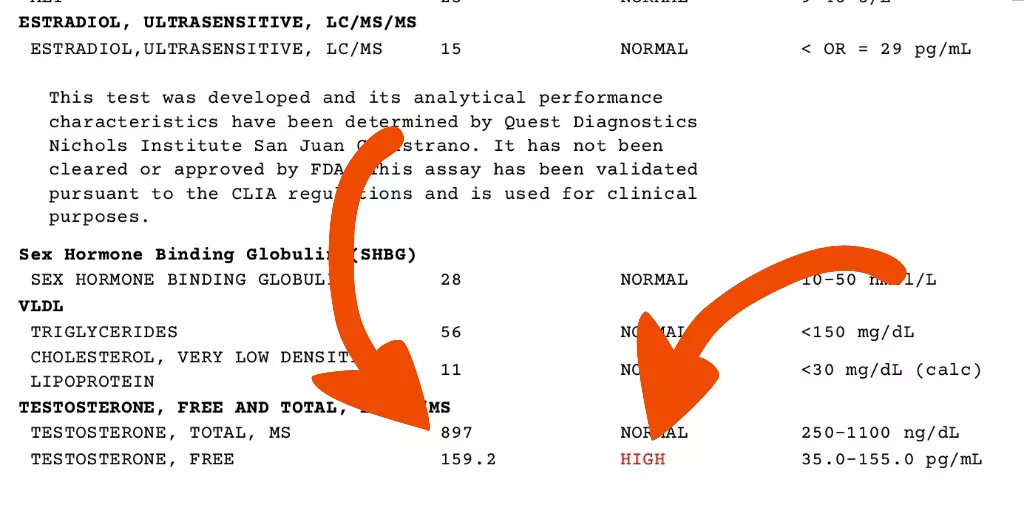
Strength & aesthetics are just a nice bonus:
Last Year (July)

2 Months Ago

Let me be blunt:
The information in this article can change your life in ways you never thought possible.
You’re here today for a reason, and that reason isn’t mental masterbation.
If you want results, your participation is required. Action is required.
“Knowledge without action serves no practical purpose.”
After you read this, you will have everything you need to get life changing results.
Countless others just like you have done it.
Now it’s your turn.
Let’s go. 👇
What Is Intermittent Fasting?
Intermittent fasting is the abstinence from caloric consumption for a particular period of time.
A Few Examples
- Skipping breakfast.
- Eating everything you want for 5 days of the week, with two 24-hour fasts in between.
- Fitting all your meals within an 8 hour window each day.
All of the above methods fall within the realm of intermittent fasting.
Whether you realize it or not, you already practice IF. We all do - every time we sleep.
All you need to do now is extend this overnight fast a bit in order to reap benefits.
Are There Any Special Rules?
The only hard fast rule is that ZERO calories are consumed during the fasting period.
You can eat whatever you want and as much as you want - when outside the fasting window.
The ONLY thing that matters is when you eat …
… unless, of course, you have other goals in mind (i.e., hacking androgen levels, building muscle, or losing fat).
Can I Eat/Drink Zero Calorie Foods?
It depends.
Are you a purist?
For non-purists, coffee, diet soda, sugar-free gum, and calorie-free sweeteners are acceptable.
Just be aware that many ‘zero-calorie’ foods do often contain calories. There is a legal threshold where manufacturers can still claim ‘calorie-free’.
Key Takeaway
It’s a personal decision.
p.s. I’m a non-purist because, well, coffee is something of a religion to me. 😉
It Sounds Like A Gimmicky Fad Diet
Fasting has been around for 1000s of years. To call it a fad is ludicrous.
It’s is not a diet - More like a pattern of caloric intake.
In fact:
It’s been around since waaay before the concept of dieting even existed.
Humans evolved in a hunter-gather setting where intermittent fasting was the norm for millions of years.

Key Takeaway
IF is an eating pattern that alternates between extended periods of fasting and short windows of eating. It typically cycles over 24 hours.
Why Is IF Suddenly All The Rage?
A few reasons:
- It works (A client of mine described it as ‘voodoo magic’ after finally losing weight after failing for years.)
- It’s easy
- It’s free
- Modern science has validated an impressive (and ever-growing) list of impressive health benefits. Before getting into hormones and the other benefits, let’s look at how intermittent fasting works.
How Does IF Work?
Here is a down-n-dirty list of the different windows of fasting and its benefits.
The “Just Skip Breakfast” Method
This is the simplest method of intermittent fasting:
Simply push back your first meal 4-8 hours after waking.
** “But isn’t breakfast the most important meal of the day?”**
This is what we’ve been told for years, but have you ever asked yourself why this is true?
Well, for starters, several studies have shown that breakfast eaters are less likely to be overweight and have a lower risk of chronic disease (1, 2, 3).
On the flip side, breakfast skippers are more likely to be smokers, drink alcohol more frequently, have a higher body mass index, and less likely to exercise (4).
This is why so many experts are quick to recommend breakfast as being so important. But the reality is that these are just observational studies that show a correlation and not causation:
Although breakfast eaters tend to be healthier and leaner, research does not prove that breakfast is the cause for their superior health.
And if you believe that eating breakfast and many small meals throughout the day is the best way to stoke your metabolism, think again. Multiple studies have shown meal frequency to have no impact on weight-loss or metabolic rate (5, 6).
All of this leads us to the conclusion that:
There is nothing special about breakfast.
Nor is there anything special about any other meal. What’s most important is the number of calories you eat, the foods they’re coming from, and your macronutrient balance.
If having breakfast in the morning energizes your day and optimizes your performance, by all means, go for it. But if you also want to implement intermittent fasting, then ‘skip breakfast’ method is for you.
Eat-Stop-Eat (The 5:2 Method)
The Eat-Stop-Eat Method of intermittent fasting was popularized by Brad Pilon:
Eat regularly every day of the week, with two 24-hours in between.
It’s also known as the 5-2 method. It’s a type of intermittent fasting where 5 days out of the week you eat as you usually would, and 2 days of the week, you restrict your calories to approximately 500 (for females) or maybe even 600 calories per day (for males).
For example:
You could choose Tuesday and Friday as your two fasting days. You would normally eat till, say, 6 p.m. on a Monday and fast up until 6 p.m. the next day. You would do the same for your Friday fast.
The benefits of Eat-Stop-Eat include simplicity and metabolic resets.
It’s important to point out that this method has never been scientifically researched.
The remaining ‘methods’ below are nothing more than fasting windows.
Here’s how it works:
At 4 to 8 Hours
- There is no more food left in the stomach
- Insulin has stopped being produced
- Average blood sugar levels have dropped and level out
At 12 Hours
- Your body begins to put the focus on self-repair (healing)
- All food consumed 12 hours ago has been used as energy
- Your gastrointestinal tract has slowed
- levels of human growth hormone begin to increase
- Glucagon starts to release at a faster rate to aid in balancing out blood sugar levels
At 14 Hours
A 14 hour fast might also be a good starting point for men and women who are new to intermittent fasting.
At 14 hours, there is a significant jump in HGH, and your body starts to use fat as its primary energy source.
At 16 Hours
The 16/8 Method was pioneered by Martin Berkhan on his popular Leangains Blog. The premise of 16/8 is simple:
Fit all your meals within an 8-hour window
16/8 is amongst the most popular and well-researched styles of IF.
As the name 16:8 implies, you’re required to fast for 16 hours with this type of IF. Then you have an 8-hour window to eat as you normally would.
Your eating window can be chosen in any 8-hour time block that suits your schedule and preferences.
If you love having breakfast or if breakfast meetings are a regular part of your day, your eating window can last anywhere from 9-10 a.m. to about 5-6 p.m.
That said, try and keep your eating window consistent on a day-to-day basis. Ghrelin, the hunger-inducing hormone, tends to secrete based on our eating patterns. Eating at the same time every day can help make diet adherence easier.
At 16 hours, your body starts to use your body fat as it’s primary energy source at a very aggressive rate. Body fat begins to be used at a very rapid pace for energy.
At 18 Hours
Once you start to increase your fasting time from 16 to 18 hours, things begin to get a little bit more complicated.
Fasting 18 hours a day will give you a 6-hour window for eating. 6 hours is just enough time to eat two meals and MAYBE eat a little snack somewhere in the middle.
Levels of human growth hormone begin to increase at super-fast rates.
OMAD / 24 Hours
What is OMAD?
OMAD stands for “One Meal A Day”.
This is one of the more extreme versions of intermittent fasting where you literally only eat once per day.
- Ketones start to release into the bloodstream.
- All glycogen stores have been used up.
- Your cells begin to disassemble dysfunctional processes and components within them - a process that is also known as autophagy.
At 36 Hours (Alternate Day)
- There is a 300% increase in autophagy.
At 48 Hours
- Another slight increase in autophagy, this time by 30%.
- Regeneration begins.
- The immune system completely resets.
- There is a significant reduction in inflammation and the inflammatory response.
At 72 Hours
- Autophagy peaks.
9 Benefits Of Intermittent Anabolic Fasting
And now for the good stuff.
You’re about to learn the answer to the question:
How does fasting influence hormone levels?
Consider the different windows of intermittent fasting you just learned.
All of them have you skipping breakfast.
Why is this important to note?
Because it’s the key to optimizing hormone levels. Consider that insulin, cortisol, testosterone, ehmm - ALL hormones - are most labile first thing in the morning.
Let’s look at the science:
Benefit #1 - IF Prevent’s Acute Episodes Of Low T
Every time you eat something, your testosterone takes a hit (7), and this drop can remain significant past the 3-hour mark (8, 9).
If you currently follow the general recommendation of eating 6 small meals throughout the day, just know that you’re effectively causing your testosterone to plummet after each meal.
With intermittent fasting, your meals are fit within a shorter eating window. As such, you’re eating fewer times during the day and allowing more prolonged periods of uninterrupted testosterone secretion.
Key Takeaway
Caloric ingestion causes a drop in testosterone. With intermittent fasting, you have fewer instances of caloric ingestion during the day, allowing the testosterone to remain elevated for longer periods of time.
There have been several studies showing that intermittent fasting increases testosterone levels.
Benefit #2 - IF Stimulates Testosterone Synthesis
In a study published in the European Journal of Endocrinology, researchers set out to observe the impact of a short-term fast on men’s androgenic hormonal concentrations. Blood samples were collected once before and once after a short-term fast.
Researchers found that the short-term fast increased the subjects’ LH (a precursor to testosterone) response by 67% and the corresponding testosterone response by 180% (10).
Although this finding is remarkable, I would recommend that you take it with a pinch of salt.
It’s important to understand the difference between an acute change and a baseline change. The above study found an over-night fast to induce an acute (short-term) 180% increase in testosterone, but it’s not like this increase will sustain over the long-term. Also, I was unable to find any other studies that replicate this result.
Key Takeaway
We now have direct evidence that a short-term fast results in a 180% increase in overall testosterone levels and a 67% increase in luteinizing hormone (the immediate precursor to testosterone).11.
Benefit #3 - IF Amplifies Human Growth Hormone (GH) Production
GH plays a crucial role in the proper growth and development of adolescents. In adults, it regulates tissue recovery, brain function, energy levels, aging, and metabolism (12).
IF can induce a significant increase of GH secretion - with some studies showing up to a 2000% increase (13, 14).
We know that traditional (multi-day) fasting increases HGH.
For example:
After 3 days of fasting, HGH levels have been shown to increase by 300%. This same study showed that after one week of regular fasting, a whopping 1250% increase in HGH.
Does intermittent fasting increase HGH too?
Yes - IF boosts GH levels in primarily 2 ways: 👇
Decreased Levels Of Insulin
By shorting the period of eating to just a few hours keeps insulin levels low for most of the day. Elevated insulin levels lead to a reduction in growth hormone.(15).
Reduced Belly Fat
This is one of the coolest benefits of intermittent fasting.
As we start to lose weight, we inevitably begin to lose belly fat as well. Unfortunately, it’s often one of the last areas of fat to be lost on our body, but it does start to decrease as we continue to shed off the pounds.
As HGH levels climb, we start to lose more and more belly fat as HGH has been proven to directly target belly fat. (16)
Soon there starts to be this cycle of reduced stomach fat that thereby increases levels of HGH. As HGH levels rise, we tend to lose more and more inches around our waist. The longer we do intermittent fasting, the longer this cycle has to build itself up. Eventually, our HGH levels are through the roof.
Key Takeaway
The production of GH and testosterone go hand in hand - higher GH leads to higher testosterone (17).
Other Benefits Of High HGH Levels
- Increased muscle and strength (18)
- Accelerated fat-loss (19)
- Fix erectile dysfunction (20)
- Improved mood (21)
- Improved sleep (22)
Key Takeaway
More GH is definitely something you want more of running through your veins.
Benefit #4 - IF Resets Insulin Regulation
Insulin is a hormone that extracts glucose from carbohydrates for your body to use for energy or to store for later use.
Insulin & Testosterone
-
It has been well established (23) that higher blood sugar levels are associated with decreased testosterone.
-
Science tells us that men who have insulin resistance also have low testosterone levels.(24)
-
In a study published by the American Diabetes Association, researchers found testosterone levels to be positively correlated with insulin sensitivity (25).
Insulin Sensitivity
Over time, elevated blood sugar leads to a decrease in insulin sensitivity.
What is insulin sensitivity?
Insulin sensitivity is a measure of how much insulin is required by your body to deposit a given amount of glucose. When insulin sensitivity is high, only a small amount of insulin is necessary to lower blood glucose levels. When insulin sensitivity is low (aka insulin resistance), your body does not appropriately respond to insulin. As a result, more and more insulin is required to deposit that same amount of glucose. In extreme cases, insulin resistance can lead to type 2 diabetes.
As it turns out, fasting is extremely beneficial for insulin sensitivity (26). A short-term fast induces a significant drop in blood sugar levels (27), meaning that your body is primed for fat-loss. Also, the food you eat is more likely to be directed towards muscle tissue rather than fat (28).
A short-term fast also provides a lift to the hormone adiponectin (29), a hormone that can possibly reverse insulin resistance (30).
Insulin & Cortisol
The story of insulin sensitivity as it relates to testosterone starts with another hormone called cortisol.
Cortisol naturally spikes in the morning. Knowing this, consider the situation we create for ourselves each morning after eating breakfast.
- Breakfast causes a spike in blood sugar
- Our body compensates for this spike in blood sugar by releasing insulin from our pancreas.
- Blood sugar drops rapidly
- Cortisol levels are already at their peak
The combination of rapidly dropping blood sugar and elevated cortisol creates a situation where our bodies start to experience hunger (when they actually are not). This leads to us eating more and perpetuating the whole cycle all over again.
This cycle leads us to consume an excess of calories leading to insulin resistance over time.
By skipping breakfast, we allow our cortisol levels to drop and avoid this whole situation. As a result, our T levels remain elevated.
As an added bonus, by avoiding this cycle, we consume fewer calories. This leads to a decrease in BMI. Elevated BMI is an established risk factor for lower testosterone levels. (31)
Benefit #5 - IF Helps You Lose Estrogenic (Stubborn) Body Fat
Getting lean is the best way to naturally enhance your testosterone.
This is because body fat produces an enzyme called aromatase that converts testosterone into the female sex hormone, estrogen. By lowering your body fat, you reduce aromatase activity and prevent the breakdown of testosterone.
With intermittent fasting, you will be eating fewer meals per day. Doing so automatically facilitates a calorie deficit (unless you’re pigging out at every meal). Being in a calorie deficit is the golden rule of fat-loss, and IF steps it up a notch by boosting your metabolic rate.
Studies show that a short-term fast can increase energy expenditure by upwards of 14% (32, 33).
Intermittent fasting provides a powerful one-two punch that benefits both sides of the energy balance equation.
It decreases calorie intake (since you eat fewer meals per day), and It increases calories burned (since your metabolic rate is faster).
An interesting study on this phenomenon split 34 guys into two groups. Subjects in both groups ate the same amount of calories and were put on the same resistance training program.
The only difference was how the subjects timed their meals.
Subjects in the first group ate their meals at 1 p.m., 4 p.m., and 8 p.m. Subjects in the second group ate their meals at 8 a.m., 1 p.m., and 8 p.m.
After 8-weeks, the subjects eating within an 8-hour window lost more body fat while maintaining muscle mass (34).
Key Takeaway
Intermittent fasting enhances your metabolism and can help you burn more calories at rest. Burning more calories at rest equals faster fat-loss. The lower your body fat, the more testosterone is allowed to remain unconverted into estrogen.
Benefit #6 - IF Regulates Leptin
Leptin is a master hormone responsible for energy regulation.
Higher leptin equals lower testosterone (35).
And it turns out:
Fasting is a proven way to bring down Leptin (36).
Said another way:
Short term fasting down-regulates leptin levels.(37) And there is an inverse relationship between Leptin and testosterone.(38)
Key Takeaway
Fasting decreases Leptin, and the result is higher testosterone levels.
Benefit #7 - IF Fights Off Inflammation
Oxidative stress occurs with an increase of free radicals in the body.
Free radicals are highly reactive molecules that interact with your body’s cellular structures (like protein and DNA) and damage them. If left uncontrolled, oxidative stress can speed up the aging process and lead to the development of many chronic and degenerative diseases (39).
Research has shown intermittent fasting to be an extremely effective measure against markers of oxidative stress (40, 41).
Chronic inflammation is another condition that causes damage to both the cell and gene level. It is linked with a host of chronic illnesses like depression, heart disease, and obesity. Chronic inflammation also elevates cortisol production. Increased cortisol is linked with decreased testosterone. Intermittent fasting helps on both of these fronts as it has been shown to significantly reduce chronic inflammation (42, 43).
Key Takeaway
Intermittent fasting can help fight off inflammation and rid your body of free radicals.
Benefit #8 - IF Increases Cellular Repair
With the millions of processes taking place in your body every day, cells get worn out. Ideally, the body identifies these worn-out cells and repairs them through a process called autophagy. In the reparation process, the cells are cleared of toxins and estrogenic chemicals.
A high rate of autophagy plays a role in diseases prevention(44):
Cancer, Neurodegeneration, Cardiomyopathy, Diabetes, Liver disease, Autoimmune diseases, and Infections
Short-term fasting significantly enhances autophagy (45).
Key Takeaway
Intermittent fasting helps rid your cells of toxins and estrogenic chemicals. Intermittent Fasting Quick-Start Guide
Benefit #9 - IF Has MANY Other Benefits
In addition to hormone regulation, intermittent fasting has seemingly countless other benefits.
Here’s a quick list of some of the other benefits of intermittent fasting:
- Healthier looking and “brighter” skin
- Increased energy
- Get sick less
- Decreased bloating
- Decreased inflammation
- Decreased joint pain
- Improves recovery time
- Better sleep
- Decreased gastric reflux
- A lower A1C
- Improved sense of wellbeing
- Less stress
- Reports of decrease in gray hair and even return to normal hair color
- Decreased pain
- Increased self-control
- Less acne
- Fewer issues with IBS
- Decreased depression symptoms
There is a mountain of research supporting each of the benefits listed here.
I’ll give you one example:
A University of Utah study found that people who fasted just one day per month were 40% less likely to suffer from clogged arteries (46). There were over 500 subjects, and researchers accounted for habits like smoking, fasting, caffeine intake, and alcohol consumption. ** fasting was the only habit that correlated with lower rates of heart disease**. Even after adjusting for things like age, weight, diabetes, and blood pressure, the difference between fasters and non-fasters remained the same.
Okay. Let’s get back to hormones and mens health:
IF For Bodybuilders
I’m going to show you how I do intermittent fasting specifically to increase my own male hormones.
There are specific modifications I make, depending on my goals at the time.
You can optimize your hormone profile while simultaneously reaching different goals:
- Weight Loss
- Building Muscle
Cutting (Weight Loss)
One of the best things about intermittent fasting is that the vast majority of people doing it can lose weight without counting calories.
This is because when you limit the window of eating, it’s often hard to over-consume. After you eat for the first time after a fast, you tend to feel full faster.
That being said, some people still struggle to lose weight with IF.
There are many possible options for someone in this situation, but the best way to overcome this issue is to count calories.
I recommend using an app like myfitnesspal to count calories.
How do you know how many calories you should eat to lose weight?
Each person is different, but a quick way to figure out roughly how many calories you burn each day is to take your body weight in lbs and multiply by 15. The result is how many calories it takes to MAINTAIN your bodyweight.
For example:
A man who weighs 200lbs would be 200x15 = 3000 calories. As I said, this is how many calories he would need to maintain his weight.
To lose weight, all he has to do is consistently eat less than this.
How much less?
It depends on how quickly you want to lose weight, but depending on your goals, there is such a thing as losing weight too quickly.
Why?
Well, losing weight too quickly can lead to excessive muscle loss. Generally speaking, most people want to lose fat while maintaining muscle at the same time. Better yet, lose fat while gaining muscle at the same time.
How much of a calorie deficit can you have to maximize weight loss while preserving muscle?
Research has shown that the sweet spot is around 25% of your total daily energy expenditure (TDEE).
Let’s look at our example again.
So far, we have a 200lb male who we have determined burns around 3000 calories per day. To lose weight while minimizing muscle loss or potentially even gaining muscle, he would aim to eat 3000 -(3000x0.25) 750 calories per day or 2250 calories per day.
Keep in mind that these numbers are just general guidelines or good starting points. As mentioned above, everyone is different.
Bulking (Building Muscle)
Intermittent fasting is typically thought of as a weight-loss strategy, but I’m here to tell you that it can absolutely be used to build muscle as well.
How?
It all comes down to energy balance.
You know, the ol’ “calories in versus calories out” adage.
While traditional bodybuilding strategies work great for making you look good, unfortunately, these strategies tend to take a dump on your testosterone levels.
It seems counter-intuitive, but it’s true.
The good news is that it doesn’t have to be that way. IF is an excellent solution for bodybuilders who also want to optimize their hormones and reap the benefits of higher testosterone and HGH levels.
Key Takeaway
Combining intermittent fasting with resistance training is an excellent way to gain muscle, lose fat, and increase testosterone levels naturally.
Food List
Here is a list of the foods you are allowed to have while in a fasting window:
- Water
- Coffee (no cream or sugar)
- Tea
- Diet soda
- Sugar-free gum
- Anything with 0 calories
And here is the list of foods I recommend for your eating window.
Medications
A quick note about medications and vitamins:
It should be obvious, but you should always follow the recommendations of your physician. Never opt to do anything different from what your doctor tells you, ESPECIALLY when it comes to medications.
Unfortunately, medications and OTC vitamins often contain fillers in them that are enough to effectively break your fast and halt autophagy in its tracks.
That being said:
With some medications, the timing isn’t that important. For other drugs, the timing is imperative. Talk with your doctor and see if it would be appropriate to change the time you take your medicine to fit the times you’re not fasting.
Before and After Intermittent Fasting Results Pics
IF can produce some pretty impressive results.
I interviewed several men from the “Intermittent Fasting Lifestyle” Facebook group who have been able to transform and rebalance their bodies.
A HUGE shout out to Charles Evans, Jonny Oddo, Sifat Raquib, & Tobias Karlsson.
All of them answered the following questions:
- How long have you been doing IF?
- How much weight have you lost?
- What sort of foods did you eat?
- What is your diet like?
- Are you a purist, or did you drink coffee, diet soda, sugar-free gum, etc.?
- Have you noticed any of the classic signs and symptoms associated with increased T levels (i.e., more energy, increased muscle mass, lower body fat percentage, more clarity of mind, etc.)?
Before & After #1: Charles
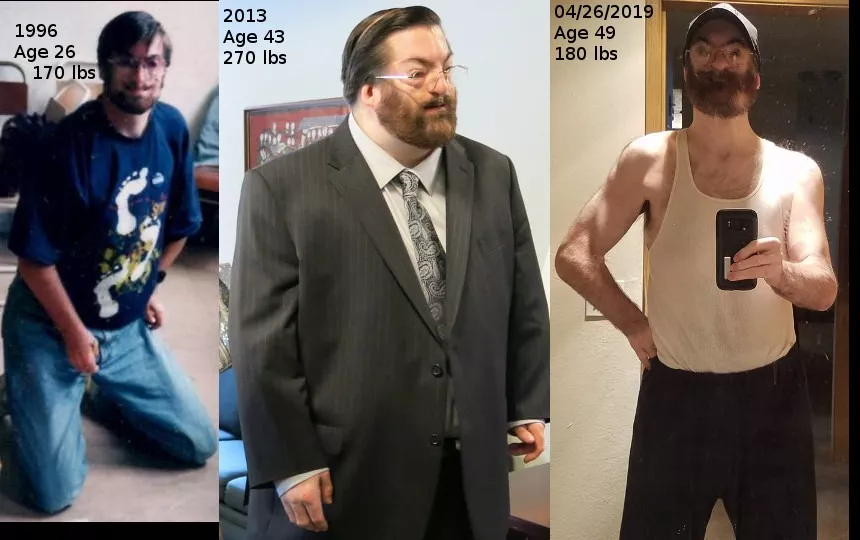
I’ve tried most of the different types of intermittent fasting. I started with 16:8, 18:6, 20:4. I currently do 22:2 OMAD. I don’t do keto or any other diet restriction.
I’ve been doing IF for 11 months now and lost 50 pounds. Although I’ve been in maintenance mode since March of this year (2019). In 2015 I weighed 270lbs. Over the next 3 years, using only portion control, I’ve lost 30lbs. Then in 2018, from the end of April to July, I lost 13lbs with portion control and daily walking. I discovered IF at the end of July in 2018 at the weight of 230lbs. I was down to 199lb by December. I was in the 180lb range by February/March of 2019. I’ve been in maintenance mode ever since. I’ve been pleasantly surprised.
Intermittent fasting seems too easy when you first hear about it. “I can lose weight just by not eating? I don’t have to do some weirdly restrictive plan?”. The only thing I restrict myself from is soft drinks. Otherwise, I eat what I want. Mostly I try to be healthy. My typical meal consists of a large chicken breast, a vegetable mix consisting of carrots, green beans, baby spinach, and peanuts. I also do a sandwich of multigrain bread, mayo, mustard, hot sauce, and deli smoked turkey. Dessert is usually ice cream. Sometimes I treat myself and get a medium pizza and garden salad from Dominos or go out to an Asian buffet restaurant nearby.
Only water for me. It was a pretty easy choice for me. I had to cut out soda back in 2015 after getting diagnosed with type 2 diabetes. I can’t stand the taste of coffee and never was a fan of tea. Just leaves me with water. The coffee thing is ironic, considering I live in Seattle.
Currently no exercise. I do walk every day for about 2 miles. I have some items at home for infrequent exercise of muscles, dumbbells, that sort of thing.
I knew that it increased HGH but have not heard about testosterone. But yes, clear thought processes, more alert, leaner body mass (aside from my stubborn belly fat).
Before & After #2: Jonny

I do keto IF. 18/6 Monday through Friday. 20/4 on Saturday and OMAD on Sunday.
I’ve been doing this for 11 months now. I started at 330 lbs and am currently 199 lbs.
I eat greens, fruits, meats. I never track my calories. I knew I was eating at a calorie deficit because the weight kept coming off, and my clothes fit differently. Tracking your macros is very important for a lot of people, though. I guess I just never needed it.
During my fasting window, I drink black coffee and water only.
I work out in the gym 5 days a week. 3 days of strength training and 2 days of cardio.
Yes, all of the above. I’m like a different person now with all the energy I have. I go non-stop from 5:30 AM to 10:30 PM when before I little to no energy. My muscle mass has increased, and my mental clarity is above and beyond better.
Anyone who knows me knows I love my beer, Mountain Dew, pizza, wings, fast food, and pasta. I could eat and drink with the best of em. Honestly, anything that was unhealthy I’d consume.
I had no energy and no motivation. Waking up every day was a struggle. I was always the guy that hid from the camera. If someone did take a picture of me, I would always make sure to tell them not to post it on Facebook.
But I couldn’t hide from the cameras on my son Waylon’s 1st Birthday. I remember going home that night, getting on Facebook, and seeing myself in those pictures. I was very depressed and embarrassed about how big I was.
I remember telling my wife Ivy that night I was going to do whatever it took to change my life around.
My brother Jason introduced intermittent fasting to me, and it completely changed my life.
I have lost 130lbs. No more back pain or knee pain. I am off blood pressure pills and my addictions are gone!
It wasn’t easy.
I wanted to quit many times, but I wouldn’t allow myself. This is just the beginning for me. I have a lifetime to go.
I want to remain healthy for my beautiful wife Ivy and my son Waylon! I hope this might inspire somebody who felt the same way I did. I put my faith in God, and he guided me to where I am today. I know I couldn’t have done it without him by my side.
Before & After #3: Sifat

I do 20/4 or sometimes 19/5.
It will be 1 year next month. I’ve lost about 80lbs from 230lbs to 160lbs, but I’ve been working out as well, so I bulked up to 172lbs.
My meals are 4-5 eggs, veggies, any type of peanut butter - 2 to 3 spoon fulls, and that’s it. I do mix it up every few weeks, so I don’t get tired of it. I eat lots of turkey and chicken breasts in place of eggs with salads. I try to stay away from red meat. I eat anywhere between 1200-1500 calories (per day). On days I work out it’s 1500. I have 1 cheat day every Saturday where I eat something different, but I don’t go overboard.
For fasting, I do nothing but water, coffee, 0 sugar, and calorie products.
I work out 5-6 days a week. I only do calisthenics, cardio, and ab workouts.
Very true. I was skinny before, and then I gained weight, but this time I mixed IF with it and noticed a big difference. I’m stronger. Getting muscle is a lot easier than muscle memory. My body fat percentage is at an all-time low of 11%, but I’m aiming for 6%.
Before & After #4: Tobias
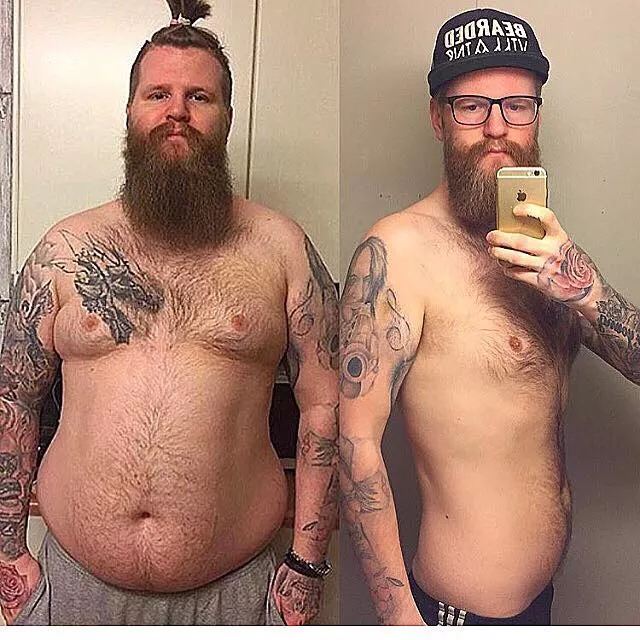
Omad! One meal a day, fasting 23 hours a day for 10 months and 16/8 5 months.
I’ve lost 54 kg! (~119lbs) over 15 months now.
I eat everything! Pizza almost every week, for example. No special dietary restrictions. No candy, but nothing else.
I do drink black coffee and water while fasting.
As far as diet goes, I drink almost 2 liters of diet soda every day, mostly Pepsi max. Dirty fasting. I tried 3 weeks with only water and didn’t notice any difference, soon went back to the diet sodas. I wouldn’t survive without coffee - Haha.
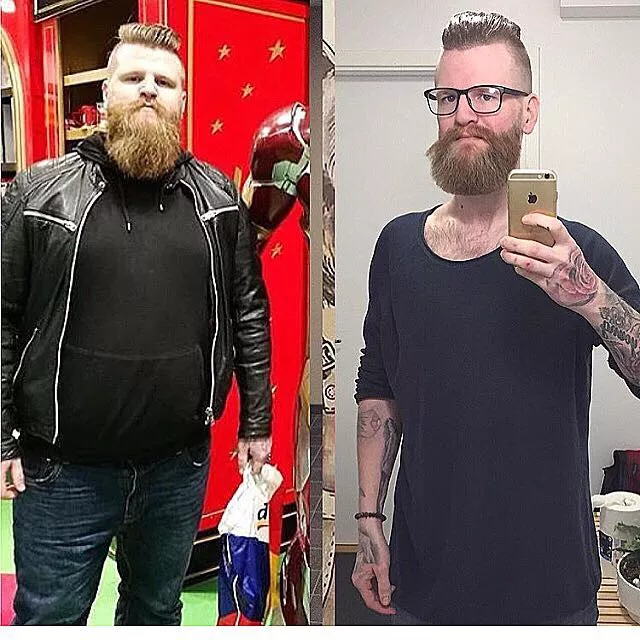
Nope. I don’t work out consistently. I’ve worked out perhaps 20-25 times in 15 months. But I’m a full-time culinary student. I work between 15-30 hours a week and work in the student pub as well, so full speed all the time.
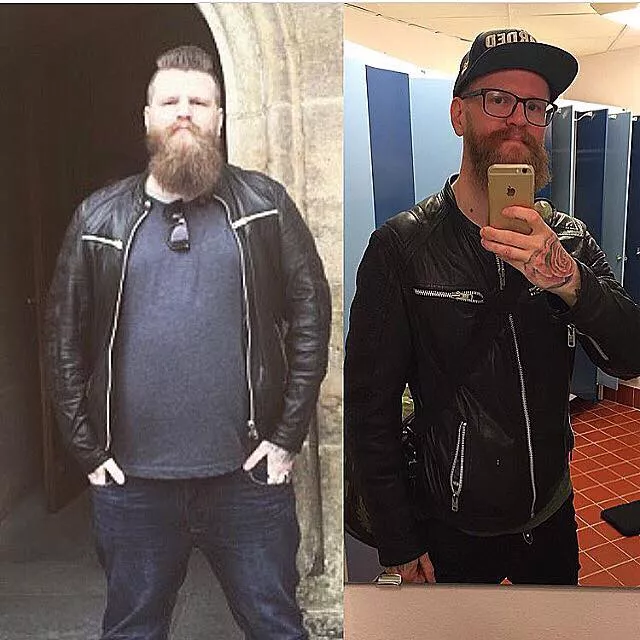
Yes! Mostly more energy & a clearer mind. I need less sleep, even if I’m working way more. I have gotten brighter. It’s like my mind is on at full speed now. Not quite as much as in the movie limitless, but a similar process.
The Best Resources Online
This article has only scratched the surface of the vast topic of intermittent fasting. To learn more, check out the following best intermittent fasting resources on the internet:
- The Leangains Guide
- Intermittent Fasting Guide by NerdFitness
- Beginner’s Intermittent Fasting Guide by James Clear
- Everything You Need to Know About Intermittent Fasting by PrecisionNutrition
If you’d like to learn more about testosterone & your diet, I recommend the following resources:
- 30+ Testosterone Boosting Foods Every Man Should Be Eating
- The Testosterone Diet Plan
- The Top 10 Testosterone Killing Foods Men Need To Avoid
At The End Of The Day
At the end of the day, it’s clear that intermittent fasting has some fantastic health benefits.
Most importantly:
Science has observed (and validated) significant increases of both testosterone and HGH in humans.
IF is just one piece of the anabolic diet puzzle, but it’s an important one.
There’s no excuse for not getting started today. Once you settle in,
You never have to think about dieting again.

